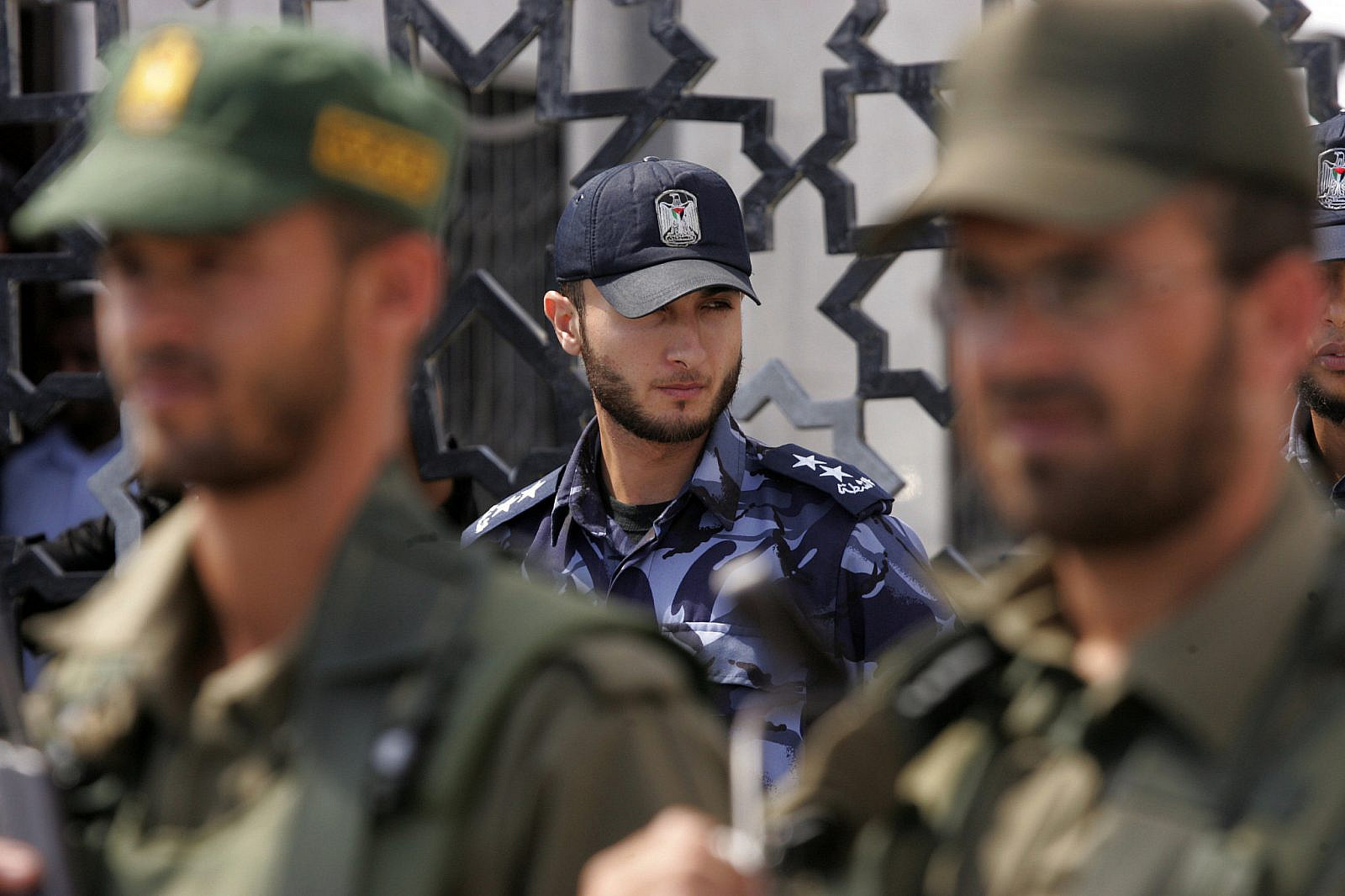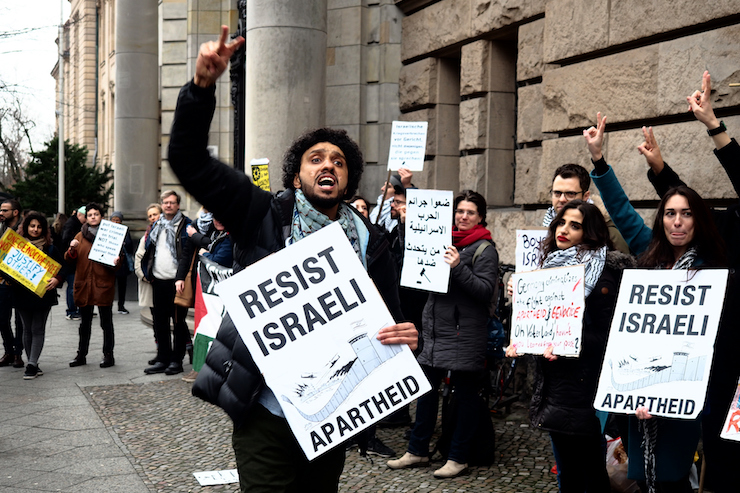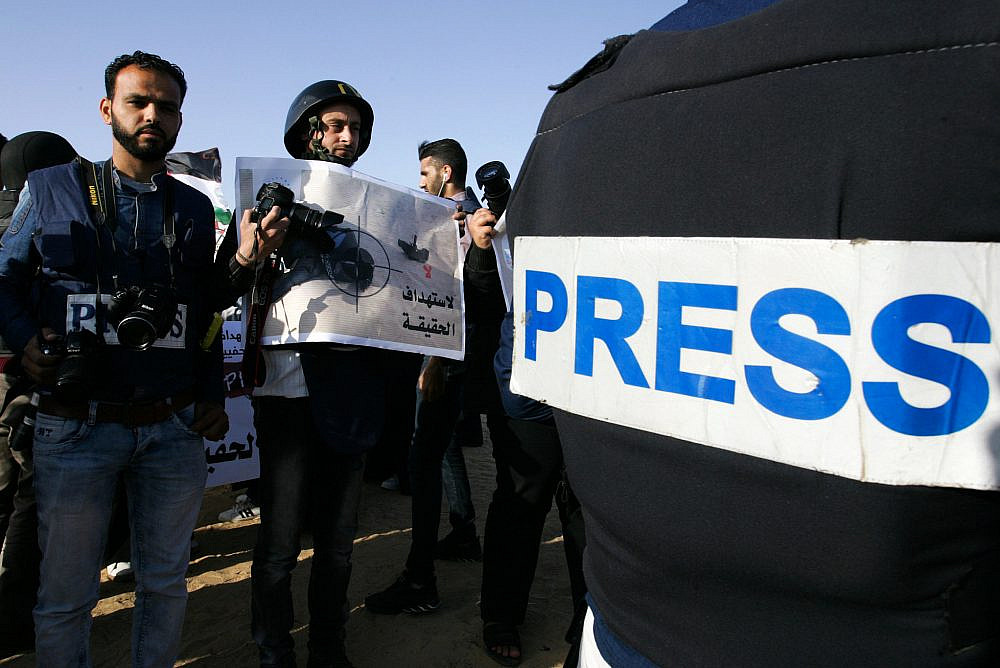Hamas security forces detained a group of young Palestinians in Gaza last week after a Palestinian journalist alerted authorities that the youth had held an online video conference with Israelis.
The online gathering, framed by the activists as a dialogue with Israeli youth, was part of a series of meetings titled “Skype With Your Enemy,” initiated by prominent activist Rami Aman from Gaza. The 107 minute-long meeting was widely shared on social media, after it was posted by Palestinians who criticized the participants for “contacting Israelis” and “promoting normalization.”
The story went viral after the New York Times published an article about the incident, in which it mentioned Hind Khoudary, a well-known journalist from Gaza who criticized the call on her Facebook page and tagged three Hamas representatives, asking them “to put an end to such a farce.” [Editor’s note: Khoudary has previously published several articles on +972].
According to the New York Times, Hamas’ military prosecution, which handles accused collaborators with Israel, issued an arrest warrant for Aman and several other men. Hamas’ armed wing and other Palestinian militant groups also issued a joint statement declaring that “normalization in all its forms and activities is treason, a crime, and religiously, nationally and morally unacceptable.”

As a result of these events, Khoudary was kicked out of a number of online journalist groups and was widely criticized by her fellow reporters. The anger is understandable — but as journalists, we should also be wary of the double standards that Palestinian journalists face when doing their job.
After all, during wartime, Israeli commentators such as Roni Daniel regularly and openly encourage Israeli forces to escalate their attacks on the Gaza Strip, yet hardly any of them face such widespread condemnation from their fellow journalists. Similar examples exist around the world.
Dialogue vs. normalization
As a journalist, I strongly condemn Khoudary for endangering someone’s life, as it violates basic journalistic ethical standards. Yet many journalists and readers went too far by attacking Khoudary for her opinions on “normalization.”
While I make no excuses for Khoudary’s actions, it is worth unpacking the complexity of the battle over normalization within Palestinian society, while pointing out the glaring disservice of mainstream media outlets when they try to explain those complexities to their readers.
The New York Times article failed to provide its readers with any thoughtful insights into the concept of “normalization,” let alone an explanation as to why so many Palestinians staunchly refuse to hold any kind of dialogue with Israelis. The piece also expresses a kind of sympathy with the depoliticized concept of “dialogue” and “peace talks,” while trivializing the anti-normalization movement and presenting anti-normalizers as people who find fault with “the idea of befriending Israelis.”
After reading the article, the average Times reader might ask her or himself: “Why do Palestinians find dialogue and breaking barriers to be such be a bad idea? Shouldn’t people on both sides look for ways to understand each other and find common ground?”
But for many Palestinians, any dialogue that lacks a political understanding of Palestinians as a colonized people is a non-starter. Many Palestinians view the whole of historic Palestine — not only the West Bank, Gaza, and East Jerusalem — as living under Israeli colonialism.
The residents of Gaza — nearly 70 percent of whom are refugees from cities, towns, and villages located in present-day Israel — do not only oppose Israel’s policies vis-à-vis the strip. They seek to decolonize the whole of the land and demand their right to return to the homes they were expelled from in 1948.
Anti-normalization activities are by no means exclusive to the Gaza Strip. Earlier this year, after President Trump announced his “Deal of the Century,” Palestinian anti-normalization activists succeeded in cancelling several other joint Israeli-Palestinian events. Similar campaigns, both in Palestine-Israel and abroad, are ongoing.
Co-resistance
Does this mean that Palestinians and Israelis can never work together? Of course not. But working together, for many activists, means refusing to treat Palestinian and Israelis as equally responsible for the so-called “conflict.”
For example, Palestinian-led movements such as the Boycott, Divestment and Sanctions movement have proposed a framework of ‘co-resistance’ as the only possible way to conduct joint work between the two populations, and only after the Israeli side has recognized Palestinians as a colonized group. The BDS movement takes a page out of the struggle against Apartheid South Africa, where “reconciliation, dialogue, and forgiveness came after the end of apartheid, not before,” and that a “proper resolution needs a correct approach.”

I am publishing these words on an Israeli-Palestinian platform that is committed to this principle of co-resistance. Here, politics are not spoken for the sake of politics, but for working to ensure all human beings living between the Jordan River and the Mediterranean Sea enjoy equal rights, dignity, and security. For myself, that means building a single, decolonized, democratic state, a vision that is welcomed and debated on this site under our joint framework.
Another example of co-resistance can be found in the anti-Zionist group “Return Solidarity,” comprised of a number of Israeli activists who have joined the weekly ‘Great Return March” protests from the other side of the Gaza fence. But it is unlikely that an anti-Zionist group that demands the right of return for Palestinian refugees, and questions the very founding of the Israeli state as much as its policies, would ever be of interest to the New York Times.
WATCH: Israeli activists speak to activists in the Gaza Strip during the Great Return March
Instead, mainstream outlets like the Times tend to focus on acts of violence by Palestinian protesters in Gaza, despite the fact that the primary source of violence at these protests are the Israeli snipers who have killed 216 Palestinians, including 46 children, and wounded over 36,100 people since the beginning of the Great Return March in 2018.
Return Solidarity is not the only example of Palestinians and Israelis co-resisting. Over the last decade, Israeli groups such as Boycott from Within and Anarchists Against the Wall have worked closely with Palestinian anti-normalization activists to struggle together against colonization and occupation. These groups are important not only because they allow us to understand what real cooperation looks like, but also make clear the ways in which mainstream media outlets misinform their readers on these complex issues.
Khoudary’s position stands in the context of this wider, important discussion about power relations in Palestine-Israel. At the same time, I agree with some of the criticisms of her actions as a journalist — criticisms that I shared when I contacted her. I would urge Khoudary to apologize, while also defending the right to her political opinion, regardless of how people perceive it.



